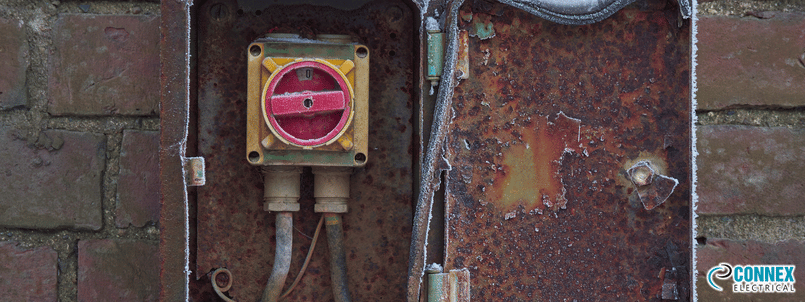Older homes often come with charming character and unique architecture, but they may also have outdated electrical systems that pose safety risks. If you own or are considering purchasing an older property, here’s what you should know about the electrical dangers these homes face, and how to address them effectively.
Common Electrical Issues in Older Homes
1. Outdated Wiring Systems
Many older homes were built with wiring that is no longer considered safe by today’s standards, such as knob-and-tube or aluminum wiring.
- Fire Hazard: Aging wiring is prone to overheating, which increases the risk of electrical fires.
- Shock Risk: Exposed or deteriorated wires can pose a risk of electrocution.
Tip: Have an electrician inspect your wiring system to determine if an upgrade is necessary.
2. Overloaded Circuits
Older homes were not designed for today’s electrical loads, which can lead to:
- Frequent Circuit Breaker Trips: If your breaker trips often, it’s a sign the system may be overloaded.
- Fire Risks: Overloaded circuits can eventually cause fires if not addressed.
Tip: An upgraded electrical panel may be necessary to handle modern appliances and devices safely.
3. Insufficient Grounding and GFCI Protection
Grounding and GFCI (Ground Fault Circuit Interrupter) outlets are essential in areas exposed to moisture, such as kitchens, bathrooms, and outdoor areas. Without these features, older homes face increased risks of electrocution.
- Shock Hazards: Inadequate grounding and lack of GFCI outlets can lead to electrocution risks, especially in wet areas.
Tip: Ensure your home has proper grounding and install GFCI outlets in moisture-prone areas.
4. Inadequate Electrical Panels
Old electrical panels may not meet modern safety codes or be capable of handling today’s energy demands.
- Insufficient Capacity: Older panels might not provide enough power for modern appliances.
- Failure to Trip: Some outdated circuit breakers may not trip properly, increasing risks of prolonged shocks or fires.
Tip: Consider replacing an old panel with a modern, higher-capacity one for improved safety and reliability.
Essential Steps for Improving Electrical Safety in Older Homes
Get a Professional Electrical Inspection
A licensed electrician can assess the entire electrical system, identifying potential hazards and recommending necessary upgrades. Regular inspections help ensure long-term safety and compliance with current electrical codes.
Upgrade Wiring and Electrical Panels
Bringing your home’s wiring and electrical panel up to date helps it meet current safety standards and handle modern electrical demands. This upgrade not only reduces fire risks but also improves energy efficiency and reliability.
Install GFCI Outlets and Grounding
To prevent shocks, replace old outlets in kitchens, bathrooms, and outdoor areas with GFCI outlets. Ensure proper grounding throughout the home to minimize risks of electrocution.
Schedule Regular Electrical Maintenance
Routine maintenance can catch small issues before they turn into bigger, costlier problems. Set up a schedule for regular electrical check-ups to keep your home safe and up to code.
FAQs
Q1: Why is outdated wiring dangerous in older homes?
Q2: How do I know if my home’s electrical panel is outdated?
Q3: What is the importance of GFCI outlets?
Q4: How often should my home’s electrical system be inspected?
Conclusion
The appeal of an older home is undeniable, but it’s essential to prioritize electrical safety. By understanding and addressing the common electrical dangers in older houses, you can enjoy your home’s historic beauty without compromising safety.
Contact Connex Electrical today to schedule an inspection or discuss electrical upgrades for your older home. Our experienced electricians ensure your home remains safe, efficient, and up to modern standards.

